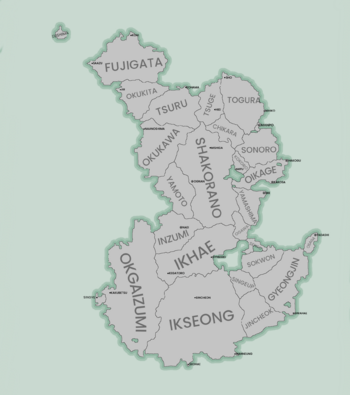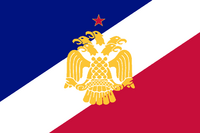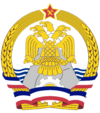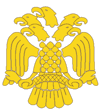Skiperia: Difference between revisions
No edit summary |
No edit summary |
||
| Line 33: | Line 33: | ||
|leader_title1 = {{wp|President}} | |leader_title1 = {{wp|President}} | ||
|leader_name1 = [[Veror Shkelyim]] | |leader_name1 = [[Veror Shkelyim]] | ||
|leader_title2 = {{wp| | |leader_title2 = {{wp|Premier}} | ||
|leader_name2 = [[Liliana Cumani]] | |leader_name2 = [[Liliana Cumani]] | ||
|sovereignty_type = | |sovereignty_type = | ||
Revision as of 00:36, 13 November 2023
This article is incomplete because it is pending further input from participants, or it is a work-in-progress by one author. Please comment on this article's talk page to share your input, comments and questions. Note: To contribute to this article, you may need to seek help from the author(s) of this page. |
Skiperian Federation Федерата ШЌиптарие (Federata Skqitarie) - Skiperian Шкиртарска Федерације (Skiptarska Federachije) - Malizian | |
|---|---|
| Motto: Вӗллаи ҙе Башким нӗ Луфтӗ (Skiperian) Братство и јединство у борби (Malizian) Brother and Unity in Struggle | |
| Anthem: Ќӗндроjмӗ си малет We Stand Like the Mountains Интернационале The Internationale | |
 Rajonet Map of Skiperia | |
| Capital and largest city | Kështjellë |
| Official languages | Skiperian |
| Recognised national languages | Malizian |
| Recognised regional languages | Datian Kodrenish |
| Ethnic groups | Skiperian Malizian Datian Kodrenish |
| Demonym(s) | English: Skiperian Skiperian: Shqiptarie Malizian/Kodrenish: Skipernac |
| Government | Federal Parliamentary Mauryist Republic |
| Veror Shkelyim | |
• Premier | Liliana Cumani |
| Legislature | Skiperian People's Assembly |
| Establishment | |
• Independence | 1047 CE |
• First Assembly | 1456 CE |
• Midhan Skedos Dictatorship | 1963 CE |
• People's Republic | 2013 CE |
| Population | |
• 2020 estimate | |
• 2022 census | |
| GDP (PPP) | 2022 estimate |
• Total | 940 Billion $ |
• Per capita | 37,645 $ |
| GDP (nominal) | 2022 estimate |
• Total | 470 Billion $ |
• Per capita | 19,362 |
| Gini (2022 estimate) | 35 medium |
| HDI (2022 estimate) | 0.743 high |
| Currency | Lek (SKL) |
| Date format | dd.mm.yyyy |
| Driving side | right |
| ISO 3166 code | SK |
| Internet TLD | .sk |
Skiperia (Skiperian: ШЌиптарие, Malizian: Скипериа, officially known as the Skiperian Federation) is a socialist state in southern Maris, emerging after the success of the socialist revolution in the country in 2013. It is situated along a peninsula in between the Jadranskian Sea to the East and the Karavastaskan Gulf to the West, separated from the rest of Maris by the Bjekët Mountains. Much of the population lies along the Western coast, including its capital and largest city, Kështjellë. The country has historically played a major role in the region, being an important hub for trade and commerce along the sea towards Chora. The end of the golden era led the country into economic ruin and decay, Although it has for the past hundred years pursued a policy of isolation and neutrality, the beginning of the 20th Century has led the country to open up once again to the outside world. It has begun to forge ties with much of the socialist world, developing close ties with its neighbor of Chora. The country continues attempt to modernize and develop, a process greatly harmed by ultranationalist and royalist terrorist forces in the North, including the LRM.
Etymology
The region has gone by numerous names throughout its history. The Ancient Chorans called the land "προβάτων", meaning "Land of Sheep", due to the large herds of sheep that roamed the hillside. Under the Lancian Empire, the territory name was lancinized as Provatonia. The Name "Skiperia" has been in use in some form since the country's original independence in 1047, referencing the symbol of the first Sudimtar Gjegj Osekuti's tribe, known as the Skqiparne. It originates from the Ancient Skiperian Word "Скипонйе" (Lancinized: Skiponje), meaning "Land of the Eagles". Ancient Skiperian legend tells of the guidance of God, in the form of an eagle, descending from the heavens to instruct Gjegj to paint a five-headed eagle on his shield. It was Osekuti's soldiers that led to the eventual victory of the 5 tribes in the Battle of the Vojsa. After this, Osekuti converted his people to Lumenism and led them eventually gain complete independence from Lancia in 1047.


